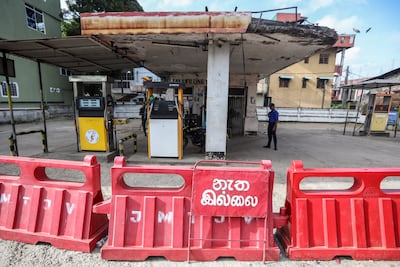Sri Lankans in the UAE fear fuel shortages will affect travel and worsen food shortages, making life difficult for their families back home as the island nation battles an economic crisis.
A ban on the sale of diesel and petrol to private vehicle owners has been enforced in the country and ordinary people are not permitted to purchase fuel until July 10.
The extraordinary measures were taken as the South Asian nation struggles to cope with its worst financial crisis in several decades.
Dubai resident
Prime Minister Ranil Wickremesinghe told Parliament last week that the economy had “completely collapsed” as he issued a warning that the situation was serious and went beyond fuel, electricity and food shortages.
Officials said the country had less than a week’s worth of fuel and stocks required for essential services such as medical transport, trains and buses.
Schools remain shut and the country’s 22 million residents have been asked to work from home.
Concerns mount for Sri Lankans in UAE
Ranitha Fernando, a Dubai banker set to return to Sri Lanka during the summer holiday, is worried about reaching his home in Colombo, about an hour’s drive from the airport.
His relatives have been limiting travel as they cannot use private cars or bikes while regular taxis are not easily available due to the petrol crunch.
“I am worried if taxis will be available for us to reach home. There are very few private taxis operating and you need to wait a lot is what I have learnt,” he said.
“My in-laws use public transport, trains and buses to travel. Everyone is managing with whatever petrol they are left with.
“My family only leave the house for a specific purpose — to buy essentials, to see the doctor or go to the hospital. It has become very difficult.”
His suitcase is filled with essential medicines the family needs including drugs to treat fever, cholesterol and diabetes, and food items such as rice, lentils and cooking oil.
As with other Sri Lankan residents, Mr Fernando has shipped supplies to his family over the past few months.
“We have sent home solar lamps [and] infrared cookers to help them cook quickly,” he said. “You have to learn to adapt.”
Fuel and food are a lifeline

Sri Lankan expatriates send home money to family regularly but the situation is a growing cause of concern with the doubling of prices of basic items such as bread.
Dubai resident Ajantha Premarathna is constantly worried about food running out at home.
“Grocery stores near my home ran out of essentials like dal and rice — that has never happened before,” said the chartered quantity surveyor who offers advice on construction costs and has lived in the UAE for about 30 years.
“My brother called to say last week the stores were out of rice and vegetable oil. Fuel and gas are the lifeline for people.
“There may be stocks in one place but because transport is scarce, it will impact food and the entire chain.
“My family are so far OK but there is a worry about an imminent scarcity of food.”
Shortages prompt price surge
Acute shortages of food and medicine have sent prices soaring for ordinary Sri Lankans.
People stand in long queues for basic food items and complain of deepening power cuts after the country defaulted on its debt with international lenders for the first time in its history in May.
Unable to cope with rising energy prices and the coronavirus pandemic that affected tourism revenue, the country does not have sufficient foreign currency to pay for fuel, cooking gas, food and medicine imports.
Mr Wickremesinghe told parliament India was the principal source of foreign aid, supplying more than $4 billion in loans this year.
The World Bank has pledged $600 million to meet payments for essential imports and the country is in talks with the International Monetary Fund on a rescue package.
Neighbouring nations such as China and Indonesia have also pledged their assistance.
'Daily life is a challenge'
Riza Muhammed, chairman of the Sri Lankan Business Council, said the next two weeks would be crucial as the government has no option but to curtail fuel usage.
“Daily life is a challenge because transport is a problem, so people don’t have a normal life,” he said.
“There was a feeling that we had reached the bottom and [that] we would start seeing some relief, but that has not happened.
“It is the daily wage-earners who are going through the toughest time. People have to plan much in advance and are trying to prepare for these shocks to their system.”




















